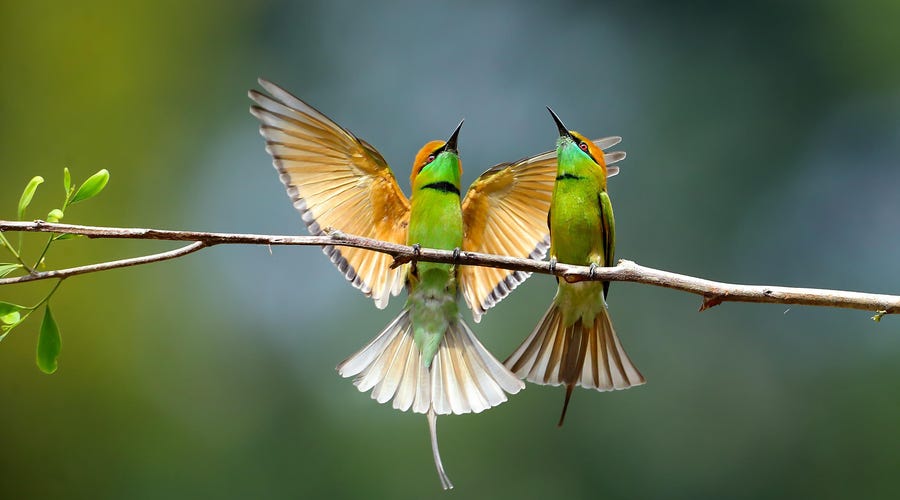
63 adorable birds in Italian to make your vocab soar like an eagle
Author: Marta Fava
You probably chose to study and learn the Italian language so that you can converse with other people, whether it is for work, or just to buy a cone in an italian gelateria… However, we’re not alone in this world!
In this article you will learn the names of the many living beings that populate our cielo (the sky!). Yes, I’m talking about birds. We’ll look at the most common flying feathered friends, so that if you want to, you can chat to the café waiter in a piazza about i piccioni (pigeons).
We’ll also cover some more specific names of birds in Italian, so that you’ll have all the vocab you need if you go on a bird-watching trip to the mountains or countryside of the beautiful Italian country.
Learning the names of birds in Italian is a great idea if you want to expand your vocabulary and add a new, fun topic to your repertoire. If you’re interested in other animals too, read our article about adorable animals in Italian.
If your animale preferito (favourite animal) is a bird, impress your Italian friends with its Italian name!
How to say “bird” in Italian
The word for bird in Italian is l’uccello / gli uccelli (loo-chell-loh / lly oo-chell-leeh). As you can see, the definite article for the singular is l’ as the word starts with a vowel. The definite article for the plural, however, remains gli.
Sometimes, when referring to small birds or when talking to children, we use the diminutive uccellino.
Another word used to talk about our feathery friends is pennuto (pen-noo-toh), although it is not as common. This comes from the word penna, which means feather. (Yes, penna also means “pen”! That’s where it comes from, as people used to write with feathers in old times…). The more scientific word for describing flying creature is volatile (voh-lah-tee-leh).
Common birds in Italian
Would you like to find out how to say eagle in Italian? Here’s a list of the most common birds.

| English | Bird name (singular) | Bird name (plural) | Pronunciation |
| Pigeon | Piccione | Piccioni | pee-cho-neh |
| Sparrow | Passero | Passeri | pass-seh-roh |
| Crow | Corvo | Corvi | korr-voh |
| Dove | Colomba | Colombe | coh-lomm-bah |
| Hummingbird | Colibrì | Colibrì | coh-lee-breeh |
| Chicken | Pollo | Polli | poll-loh |
| Hen | Gallina | Galline | gahl-lee-nah |
| Cockerel | Gallo | Galli | gahl-lee |
| Eagle | Aquila | Aquile | ah-kwee-lah |
| Duck | Anatra | Anatre | ah-nah-trah |
| Duckling | Anatroccolo | Anatroccoli | ah-nah-trok-koh-loh |
| Goose | Oca | Oche | oh-kah |
| Grebe | Svasso | Svassi | svah-sso |
| Pheasant | Fagiano | Fagiani | fah-djah-noh |
| Grouse | Gallo cedrone | Galli cedroni | Gahl-loh cheh-droh-neh |
| Cuckoo | Cuculo | Cuculi | coo-coo-lo |
| Nightingale | Usignolo | Usignoli | oo-see-nyoh-loh |
| Nightjar | Succiacapre | Succiacapre | suh-cha-cah-preh |
| Peacock | Pavone | Pavoni | pah-voh-neh |
| Swift | Rondone | Rondoni | ron-doh-neh |
| Swan | Cigno | Cigni | chee-nyoh |
| Common teal | Alzavola | Alzavole | ahl-tsah-voh-lah |
| Quail | Quaglia | Quaglie | kwah-llyah |
| Vulture | Avvoltoio | Avvoltoi | ah-vol-toy |
| Magpie | Gazza | Gazze | gadz-zah |
| Goldfinch | Cardellino | Cardellini | carr-dell-lee-noh |
| Turtle dove | Tortora | Tortore | torr-toh-rah |
| Carrion crow | Cornacchia | Cornacchie | corr-nak-kyah |
| Blackbird | Merlo | Merli | merr-loh |
| Great tit | Cinciallegra | Cinciallegre | chieen-chal-leh-grah |
| Robin | Pettirosso | Pettirossi | pet-tee-ross-soh |
| Starling | Storno | Storni | storr-noh |
| Canary | Canarino | Canarini | cah-nah-ree-noh |
| Bullfinch | Ciuffolotto | Ciuffolotti | choof-foh-lot-toh |
| Falcon | Falco | Falchi | fahl-coh |
| Cormorant | Cormorano | Cormorani | corr-moh-rah-noh |
| Pelican | Pellicano | Pellicani | pell-lee-kah-noh |
| Seagull | Gabbiano | Gabbiani | gab-byah-noh |
| Woodpecker | Picchio | picchi | peek-kyoh |
| Turkey | Tacchino | Tacchini | tak-kee-noh |
Migratory birds in Italian
Let’s now look at a list of the major uccelli migratori, which are birds that change continents with the seasons.

| English | Bird name (singular) | Bird name (plural) | Pronunciation |
| Albatross | Albatros | Albatros | ahl-bah-tross |
| Ducks | Anatra | Anatre | ah-nah-trah |
| Short-toed snake eagle | Biancone | Bianconi | byan-coh-neh |
| Montagu’s harrier | Albanella | Albanelle | ahl-bah-nehl-lah |
| Garganey | Marzaiola | Marzaiole | marr-tsa-yoh-lah |
| Stork | Cicogna | Cicogne | chee-koh-nyah |
| Swift | Rondone | Rondoni | ron-doh-neh |
| Swallow | Rondine | Rondini | rohn-dee-nee |
| Hoopoe | Upupa | Upupe | ooh-pooh-pah |
Wild and exotic birds in Italian
Sure, it is great to know the names of the birds you can find in Italy, but it is also good to know some exotic birds in Italian, just to make your knowledge more complete.

| English | Bird name (singular) | Bird name (plural) | Pronunciation |
| Flamingo | Fenicottero | Fenicotteri | feh-nee-cot-teh-roh |
| Crane | Gru | Gru | grooh |
| Parrot | Pappagallo | Pappagalli | pap-pah-gahl-loh |
| Bird of paradise | Uccello del paradiso | Uccelli del paradiso | Ooch-chel-loh del pah-rah-dee-zoh |
| Cordonbleu | Cordon blu | Cordon blu | Cor-don bloo |
| Gouldian finch | Diamante di gould | Diamanti di gould | Dyah-man-teh dee-go-oold |
| Zebra finch | Diamante mandarino | Diamanti mandarini | Dyah-man-teh man-dah-ree-noh |
| Star finch | Diamante coda rossa | Diamanti coda rossa | Dyah-man-teh coh-dah ross-sah |
Flightless birds in Italian
Not all birds can fly! Here’s a list of some flightless bird in Italian. By the way, do you remember how to say “to fly” in Italian? Yes, volare!

| English | Bird name (singular) | Bird name (plural) | Pronunciation |
| Emu | Emù | Emù | eh-mooh |
| Penguin | Pinguino | Pinguini | peen-gwee-noh |
| Ostrich | Struzzo | Struzzi | stroo-tsoh |
| Rheae | Nandù | Nandù | nann-dooh |
| Cassowary | Casuario | Casuari | cah-soo-ah-ree |
| Kiwi | Kiwi | Kiwi | kee-wee |
Bird songs in Italian
Franco Battiato - Gli uccelli - 1981
This is a great classic by Italian singer and songwriter Franco Battiato: Gli uccelli. You can’t miss it!
ULTIMO - RONDINI AL GUINZAGLIO
A more recent take on songs with birds…? Here it is: Rondini al guinzaglio, by Ultimo.
Gli uccelli per bambini - Animali vertebrati - Scienze naturali per bambini
If you’re a fan of kids’ songs, here’s one for you!
Funny bird-related sayings, quotes, phrases
| Italian | English literal translation | English meaning |
| Prendere due piccioni con una fava | To catch two pigeons with one fava bean | To kill two birds with one stone. |
| Meglio un uovo oggi che una gallina domani. | Better an egg today than a hen tomorrow. | A bird in the hand is worth two in the bush. |
| Un uccellino mi ha detto che… | A little bird told me that… | Same as in English, when you don’t want to reveal the source of your information. |
| Una rondine non fa primavera. | One swallow does not mean it’s spring. | One swallow does not make a summer |
| Quando canta il merlo, siamo fuori dall’inverno. | When the blackbird sings, the winter has finished. | The season has changes, spring is coming. |
| Quando cantano le cicale, il cuculo smette di cantare. | When the crickets sing, the cuckoo stops singing. | - |
- Prendere due piccioni con una fava. (Lit.: To catch two pigeons with one fava bean.) To kill two birds with one stone.
- Meglio un uovo oggi che una gallina domani. (Lit.: Better an egg today than a hen tomorrow.) A bird in the hand is worth two in the bush.
- Un uccellino mi ha detto che… (Lit.: a little bird told me that…) Same as in English, when you don’t want to reveal the source of your information.
- Una rondine non fa primavera. (Lit.: One swallow does not mean it’s spring.) One swallow does not make a summer
- Quando canta il merlo, siamo fuori dall’inverno. (Lit.: When the blackbird sings, the winter has finished.) The season has changes, spring is coming.
- Quando cantano le cicale, il cuculo smette di cantare. (Lit.: When the crickets sing, the cuckoo stops singing.)
Just for laughs: Parrot speaking Italian
If you just need a laugh, have a look at these adorable pappagalli speaking Italian.
Un uccellino mi ha detto che…
…You’ve become an expert in Italian bird names! Remember, to make new vocab stick, you just need to practice, practice, practice! So, in the next few weeks, channel the cute Italian parrot in the video above who diligently speaks and responds to the beautiful Italian language.
And if you want to continue the Italian vocabulary fun, keep up the joy on our free Italian lessons blog.


